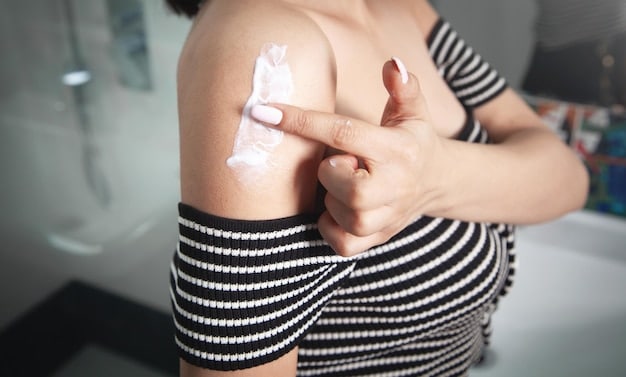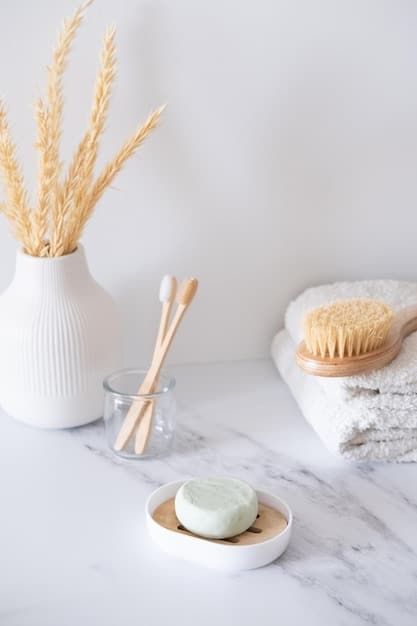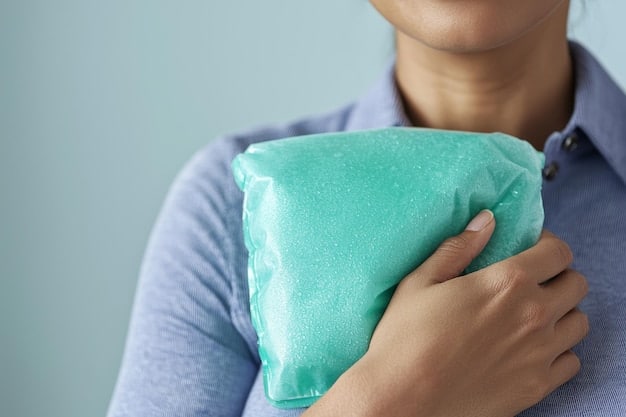Eczema Skincare Guide: Soothing & Protecting Sensitive Skin

Effective management of eczema demands a targeted skincare regimen focusing on soothing inflammation, restoring the skin barrier, and providing lasting hydration to prevent flare-ups, utilizing specific ingredients and mindful application techniques.
Living with eczema, a chronic inflammatory skin condition, presents unique challenges when it comes to maintaining skin health. The constant itch, redness, and dryness can be incredibly disruptive, making daily life uncomfortable. Therefore, understanding the nuances of Skincare for Eczema: Soothing and Protecting Sensitive Skin is not just about aesthetics, but about reclaiming comfort and confidence. This comprehensive guide will delve into the essential strategies and products that can transform your skincare routine, offering much-needed relief and protection.
Understanding Eczema and Your Skin Barrier
Eczema, also known as atopic dermatitis, is far more than just dry skin. It's a complex condition characterized by inflammation, a compromised skin barrier, and an overactive immune response. This delicate balance means external irritants can easily penetrate, causing flare-ups, while essential moisture escapes, leading to dryness and itching. To effectively manage eczema, we must first appreciate the critical role of the skin barrier – the outermost layer that acts as a shield against the environment.
The compromised skin barrier
In eczema-prone skin, the skin barrier is often “leaky.” This deficiency in lipids and proteins means it struggles to retain water and keep allergens and irritants out. Understanding this fundamental flaw is the first step towards choosing the right skincare. The goal is to fortify this barrier, making it more resilient and less reactive.
When the skin barrier is compromised, it becomes a vicious cycle. The dryness leads to itching, scratching further damages the barrier, and more inflammation ensues. Breaking this cycle is paramount. This involves not only topical treatments but also understanding triggers and environmental factors that exacerbate the condition.
- Genetic predisposition: Many individuals with eczema have a family history of the condition.
- Environmental triggers: Pollen, dust mites, pet dander, and certain fabrics can irritate.
- Irritant exposure: Harsh soaps, detergents, perfumes, and even certain foods can trigger reactions.
- Stress: Emotional stress can lead to or worsen eczema flare-ups.
The skin barrier plays a defensive role against external aggressors like bacteria and viruses. When it's impaired, your skin becomes more susceptible to infections, which can further complicate eczema management. Therefore, any effective skincare regimen must prioritize its restoration and maintenance.
Understanding these intricacies allows us to move beyond superficial treatment to a more holistic approach that supports long-term skin health. It’s about building a foundation of care that strengthens the skin’s natural defenses, rather than just treating symptoms as they arise.
We empower eczema sufferers with knowledge to make informed decisions for their skin.
Essential Ingredients for Eczema Skincare
Choosing the right ingredients is critical for effective eczema management. Not all skincare products are created equal, and for sensitive, compromised skin, certain components can make all the difference while others can trigger unwanted reactions. Focusing on emollients, humectants, and barrier-repairing agents will provide the most significant benefits.
Hero ingredients to look for
When navigating the vast world of skincare, prioritize products containing ingredients known for their soothing and barrier-repairing properties. Ceramides, hyaluronic acid, and colloidal oatmeal are some of the most highly recommended.
Ceramides are lipids naturally found in the skin barrier. They act like the “mortar” between the “bricks” of your skin cells, helping to form a protective layer that retains moisture and shields against environmental damage. Eczema-prone skin often has a deficiency in ceramides, making their topical application essential for barrier restoration.
Hyaluronic acid is a powerful humectant, meaning it attracts and holds water. It can draw moisture from the air and deeper layers of the skin, providing intense hydration. For eczema, where dryness is a major concern, hyaluronic acid helps to plump the skin and reduce the feeling of tightness and flakiness.
- Colloidal oatmeal: Known for its anti-inflammatory and soothing properties.
- Niacinamide (Vitamin B3): Helps reduce inflammation and improve skin barrier function.
- Glycerin: Another effective humectant that draws moisture into the skin.
- Shea butter: A rich emollient that helps to soften and smooth the skin.
These ingredients work synergistically to address the multifaceted challenges of eczema. Ceramides rebuild, hyaluronic acid hydrates, and colloidal oatmeal calms. Together, they create a formidable defense against flare-ups and promote healthier, more comfortable skin. Avoiding harsh chemicals and fragrances is equally important.
It’s not just about what you put on your skin, but what you keep out. Many common skincare ingredients can act as irritants for eczema sufferers. Familiarizing yourself with these potential aggressors can prevent unnecessary flare-ups and ensure your chosen products truly nurture your skin. Always read labels carefully and opt for “fragrance-free” and “hypoallergenic” formulations.
Cleansing Best Practices for Eczema-Prone Skin
Cleansing is a fundamental step in any skincare routine, but for those with eczema, it requires a delicate touch. Harsh soaps and hot water can strip the skin of its natural oils, exacerbating dryness and irritation. The goal is to cleanse gently without further compromising the already fragile skin barrier.
The gentle approach to cleansing
Opt for lukewarm water and a mild, fragrance-free cleanser specifically designed for sensitive or eczema-prone skin. Avoid scrubbing, and instead, use your fingertips to gently massage the cleanser onto your skin.
Harsh foaming agents found in many conventional cleansers can be detrimental. Look for cleansers that are labeled as soap-free, pH-balanced, and clinically tested for sensitive skin. These formulations are designed to clean without disrupting the skin’s natural protective layer, leaving it feeling soft and not stripped.
- Limit shower time: Keep showers or baths short (5-10 minutes) to avoid excessive water exposure.
- Lukewarm water: Hot water can strip natural oils, so opt for comfortably warm temperatures.
- Pat dry: Instead of rubbing, gently pat your skin dry with a soft towel, leaving it slightly damp.
- Moisturize immediately: Apply your moisturizer within three minutes of bathing to lock in moisture.
The immediate application of moisturizer after cleansing is perhaps one of the most crucial steps. This helps to seal in the hydration from the water, preventing transepidermal water loss and strengthening the skin barrier. Think of it as creating a protective seal when your skin is most receptive.
Even the towel you use matters. A rough towel can cause micro-abrasions, further irritating sensitive skin. Choose soft, cotton towels and ensure they are clean and free of harsh detergent residues. This attention to detail across your entire cleansing routine contributes significantly to managing eczema effectively and preventing irritation, laying a solid foundation for subsequent skincare steps.

Moisturizing: The Cornerstone of Eczema Care
If there’s one non-negotiable step in an eczema skincare routine, it’s moisturizing. Consistent and appropriate moisturizing is paramount for managing symptoms, preventing flare-ups, and restoring the skin’s natural barrier function. It's not just about comfort; it's about therapeutic intervention.
Choosing the right moisturizer
For eczema, thicker is often better. Ointments and creams are generally preferred over lotions because they contain a higher oil content, creating a more effective barrier against moisture loss. Look for products specifically labeled for eczema or sensitive skin.
When selecting a moisturizer, examine the ingredient list for key components like petrolatum, mineral oil, dimethicone, ceramides, and hyaluronic acid. These ingredients are champions for their occlusive and reparative properties. Their ability to form a protective layer on the skin helps to prevent water evaporation and keeps irritants out.
- Apply generously: Don't be shy with application; cover all affected areas and even seemingly healthy skin.
- Frequent application: Moisturize at least twice a day, and more often during flare-ups or after hand washing.
- Overnight treatment: For stubborn patches, consider applying a thick layer of ointment at night.
- Wet wrap therapy: Under doctor guidance, applying moisturizer under damp bandages can intensely hydrate.
Consistency is key. Establishing a regular moisturizing routine, even when your skin feels good, can significantly reduce the frequency and severity of eczema flare-ups. This proactive approach supports the skin's natural healing process and maintains its defensive capabilities against environmental stressors.
The act of moisturizing can also be a calming ritual. Take a few moments to gently massage the product into your skin, allowing it to absorb. This not only aids product penetration but also engages your senses in a positive way, fostering a sense of self-care. It’s an opportunity to connect with your body and provide it with the nourishment it needs.
Managing Eczema Flare-Ups: Quick Relief Strategies
Despite the best preventative care, eczema flare-ups can still occur. When they do, having a plan for quick relief is essential to minimize discomfort and prevent the condition from worsening. Immediate and targeted action can make a significant difference in how quickly your skin recovers.
Soothing inflamed skin
The primary goals during a flare-up are to reduce inflammation, alleviate itching, and prevent infection. Over-the-counter hydrocortisone creams can offer temporary relief for mild to moderate flare-ups. Always follow usage instructions carefully.
Cool compresses can be incredibly soothing for red, inflamed, and itchy skin. Dampen a soft cloth with cool water and apply it to the affected area for 10-15 minutes. This can help to cool down the skin, reduce the sensation of itching, and provide immediate comfort without medication.
- Anti-itch creams: Products with pramoxine or menthol can temporarily numb the skin.
- Oral antihistamines: Non-drowsy options can help with nighttime itching, promoting better sleep.
- Avoid scratching: Keep nails short and consider soft gloves at night to prevent skin damage.
- Trigger identification: Try to identify and eliminate the trigger that caused the flare-up.
It's crucial to distinguish between soothing strategies and treatments. While cool compresses and anti-itch creams offer symptomatic relief, they don't address the underlying inflammation. For persistent or severe flare-ups, a visit to a dermatologist is indispensable for prescription-strength treatments.

Dermatologists can provide specific guidance on topical corticosteroids, calcineurin inhibitors, or even newer biologic medications if your eczema is severe and resistant to other treatments. Self-treating severe flare-ups without professional advice can sometimes lead to prolonged discomfort or complications. A tailored approach ensures the most effective and safest management plan.
Lifestyle Adjustments for Healthier Skin
Skincare for eczema extends beyond topical applications and cleansing routines. Lifestyle factors play a significant role in managing the condition, influencing everything from the frequency of flare-ups to the overall health of your skin barrier. Embracing certain habits can complement your skincare regimen, promoting lasting comfort and resilience.
Holistic approach to eczema management
Consider your daily environment, diet, and stress levels. Each of these can impact your skin's ability to heal and protect itself. Small, consistent changes can yield substantial benefits for eczema-prone skin.
Clothing and fabrics: Opt for loose-fitting, soft, and breathable clothing made from natural fibers like cotton. Wool and synthetic fabrics can irritate the skin and trap heat, leading to sweating and itching. Washing new clothes before wearing them can also remove irritants from manufacturing.
Dietary considerations: While eczema is not primarily a food allergy, some individuals find that certain foods can trigger or worsen their symptoms. Keeping a food diary can help identify potential culprits. Focus on an anti-inflammatory diet rich in fruits, vegetables, and omega-3 fatty acids, which can support overall skin health.
- Stress management: Practices like meditation, yoga, or deep breathing can significantly reduce stress, a known eczema trigger.
- Humidity control: Use a humidifier in dry environments, especially during winter, to keep skin from drying out.
- Avoid extreme temperatures: Rapid changes in temperature and excessive heat can irritate sensitive skin.
- Regular exercise: Promotes circulation and overall well-being, but remember to shower immediately after to rinse off sweat.
The cumulative effect of these lifestyle adjustments can create a more hospitable environment for your skin, allowing it to recover and thrive. It’s about building a supportive framework that works in harmony with your topical treatments, empowering you to better control your eczema rather than letting it control you.
Prioritizing adequate sleep is another often-overlooked factor. Sleep deprivation can heighten stress and inflammation, potentially worsening eczema symptoms. Ensuring 7-9 hours of quality sleep each night allows your body, including your skin, to repair and rejuvenate, strengthening its natural defenses against flare-ups. A well-rested body is better equipped to manage chronic conditions.
| Key Aspect | Brief Description |
|---|---|
| 💧 Barrier Repair | Focus on ingredients like ceramides to strengthen the skin’s protective lipid barrier. |
| 🧴 Deep Hydration | Use thick emollients and humectants (e.g., hyaluronic acid) to lock in moisture effectively. |
| 🧼 Gentle Cleansing | Opt for soap-free, pH-balanced cleansers and lukewarm water to avoid stripping natural oils. |
| 🌿 Soothing Relief | Utilize ingredients like colloidal oatmeal and targeted anti-itch creams during flare-ups. |
Frequently Asked Questions about Eczema Skincare
The most crucial step in managing eczema is consistent and generous moisturizing. Applying a rich emollient or cream immediately after bathing helps seal in moisture, repair the skin barrier, and protect against irritants. This proactive approach significantly reduces dryness and the frequency of flare-ups.
While eczema is not solely a food allergy, some individuals may find specific foods exacerbate their symptoms. Common triggers include dairy, eggs, peanuts, and wheat. Keeping a food diary can help identify personal triggers. Consulting with a doctor or dietitian for an elimination diet is advisable if food sensitivity is suspected.
For eczema-prone skin, select a mild, fragrance-free, soap-free, and pH-balanced cleanser. Harsh soaps can strip natural oils, worsening dryness and irritation. Look for formulations designed for sensitive or atopic skin, and always use lukewarm water during cleansing to protect the skin barrier.
Ceramides are essential lipids that help form the skin’s protective barrier, preventing moisture loss and blocking irritants. Eczema-prone skin often lacks sufficient ceramides, making topical application vital. Products enriched with ceramides help to rebuild and strengthen this barrier, reducing dryness, itching, and inflammation.
You should consult a dermatologist if your eczema is severe, persistent, or not responding to over-the-counter treatments. A specialist can diagnose specific types of eczema, identify triggers, and prescribe stronger medications like topical steroids or calcineurin inhibitors, or suggest advanced therapies like biologics.
Conclusion
Effectively managing eczema requires a dedicated and informed approach to skincare, coupled with mindful lifestyle adjustments. By prioritizing gentle cleansing, consistent moisturizing with barrier-repairing ingredients, and understanding how to soothe flare-ups, individuals can significantly improve their quality of life. Empowering yourself with knowledge and adapting your daily habits are key steps toward achieving healthier, more comfortable skin and reducing the impact of eczema on your well-being.





